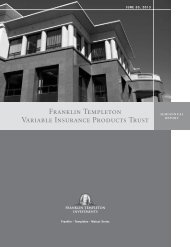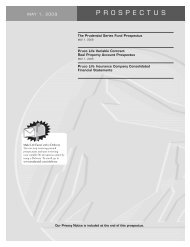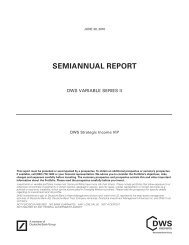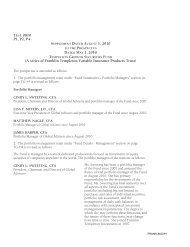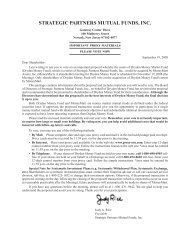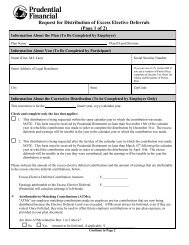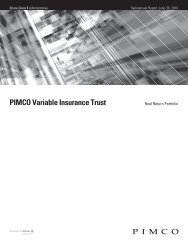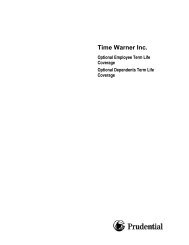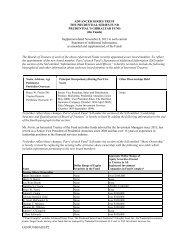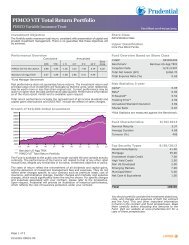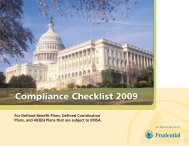Advanced Series Trust AST Academic Strategies Asset ... - Prudential
Advanced Series Trust AST Academic Strategies Asset ... - Prudential
Advanced Series Trust AST Academic Strategies Asset ... - Prudential
You also want an ePaper? Increase the reach of your titles
YUMPU automatically turns print PDFs into web optimized ePapers that Google loves.
<strong>AST</strong> Global Real Estate Portfolio<br />
Investment Objective: To seek capital appreciation and income.<br />
The Portfolio’s investment objective is not a fundamental investment policy and, therefore, may be changed by the Board without<br />
shareholder approval.<br />
Principal Investment Policies<br />
In pursuing its investment objective, the Portfolio will normally invest at least 80% of its investable assets (net assets plus any<br />
borrowings made for investment purposes) in equity-related securities of real estate companies. This means that the Portfolio will<br />
concentrate its investments in companies that derive at least 50% of their revenues from the ownership, construction, financing,<br />
management or sale of commercial, industrial or residential real estate or companies that have at least 50% of their assets in these<br />
types of real estate-related areas.<br />
The 80% policy is a non-fundamental policy of the Portfolio. The Portfolio will provide 60 days’ prior written notice to shareholders<br />
of a change in this non-fundamental policy.<br />
The Portfolio will invest in equity-related securities of real estate companies on a global basis, which means that the companies may<br />
be U.S. companies or foreign companies. There is no limit on the amount of assets that may be invested in the securities of foreign<br />
real estate companies.<br />
Real Estate Investment <strong>Trust</strong>s. The Portfolio anticipates that its investments in equity-related securities of real estate companies will be<br />
primarily in real estate investment trusts (REITs). REITs are like corporations, except that they do not pay income taxes if they meet<br />
certain Internal Revenue Service (IRS) requirements. However, while REITs themselves do not pay income taxes, the distributions they<br />
make to investors are taxable. REITs invest primarily in real estate (offices, hotels, shopping centers, apartments, malls, factories, etc.)<br />
or real estate mortgages and distribute almost all of their income - most of which comes from rents, mortgages and gains on sales of<br />
property - to shareholders. The Portfolio may invest without limit in the securities of REITs.<br />
Private Real Estate-Related Investments. The Portfolio may invest up to 15% of its net assets in ownership interests in commercial<br />
real estate through investments in private real-estate. The Portfolio will execute its strategy of acquiring ownership interests in<br />
commercial real estate through investments in, for example, single member limited liability companies where the Portfolio is the sole<br />
member, joint ventures, other equity-linked investments and mezzanine debt. The entity in which the Portfolio invests, such as a<br />
limited liability company or joint venture, may borrow to finance the purchase of real estate properties. For a limited liability<br />
company where the Portfolio is the sole member, the borrowing will generally be treated as borrowing by the Portfolio, which means<br />
that the borrowing will be from a bank and the borrowing will be counted toward the overall limit on borrowing by the Portfolio. For<br />
certain joint ventures, such as where the joint venture partner other than the Portfolio has significant responsibility and authority, the<br />
borrowing may be treated as borrowing by the joint venture alone and not by the Portfolio (provided that the lender does not have<br />
recourse to the Portfolio). Private real estate-related investments are treated as illiquid investments because they may require a<br />
substantial length of time to be sold. As illiquid investments, they may be sold at a substantial discount from comparable investments<br />
that are liquid.<br />
Investment Style. The Portfolio’s assets will be managed by <strong>Prudential</strong> Real Estate Investors, which is a business unit of <strong>Prudential</strong><br />
Investment Management,Inc. (PIM). PREI ® ‘s approach to real estate investing is value-oriented based upon real estate fundamentals<br />
and assessments of management teams. PREI emphasizes both quantitative and qualitative investment analysis, and focuses on<br />
valuation relative to a company’s underlying real estate assets as well as a company’s on-going concern valuation. Through detailed<br />
company research that includes regular management visits, property tours and financial analysis, PREI analyzes the quality of real<br />
estate asset cash flows and sustainability and growth of company dividends. PREI also evaluates the company’s strategy,<br />
management’s track record, incentives and ability to create long term shareholder value. PREI believes it adds value by its<br />
understanding and analysis of private real estate markets. PREI estimates that nearly 95% of institutional quality commercial real<br />
estate is not publicly-traded. PREI intends to invest the Portfolio’s assets globally in real estate investments.<br />
Derivative <strong>Strategies</strong>. PREI may use various derivative strategies to try to improve the Portfolio’s returns. PREI may also use hedging<br />
techniques to try to protect the Portfolio’s assets. The Portfolio cannot guarantee that these strategies and techniques will work, that<br />
the instruments necessary to implement these strategies and techniques will be available, or that the Portfolio will not lose money.<br />
Non-Real Estate Investments. Under normal circumstances, the Portfolio may invest up to 20% of its investable assets in securities of<br />
issuers not in the real estate industry. These include equity-related securities (i.e., securities that may be converted into or exchanged<br />
for common stock or the cash value of common stock, known as convertible securities), fixed income securities, U.S. Government<br />
229



